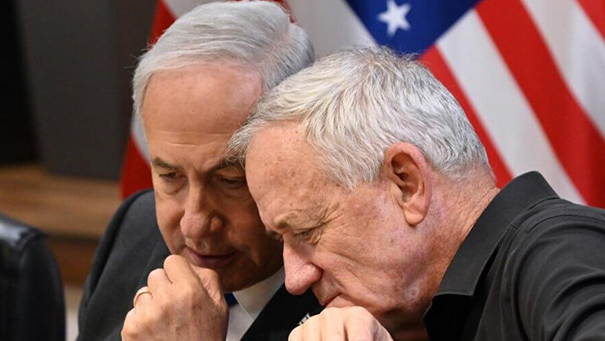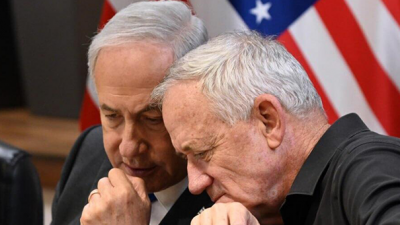Israeli war cabinet member Benny Gantz, who is visiting Washington this week, recounts a story about his mother, a Holocaust survivor who underwent surgery in Germany performed by a Palestinian doctor from Gaza. This story symbolizes hope for reconciliation. This hope fuels optimists in the Middle East, even as it faces a harsh test during the war with Gaza that erupted on October 7, the bloodiest day in Israel's history.
Gantz, 64, who leads a centrist party, joined the emergency government formed by Israeli Prime Minister Benjamin Netanyahu last year. He states, "The fact that I was willing to join a unity government with Netanyahu, who belongs to the right, and his nationalist allies from religious parties, reveals the extent of the crisis Israel is facing." He previously told a group of journalists at a press conference last year, "This is not a political partnership for me," adding that 10 family members joined their units in the largest call-up of reservists in years. Gantz further noted, "It is impossible for me to stand by and seek political interests in such circumstances."
Gantz briefly joined Netanyahu in 2020 to form a government during the COVID-19 pandemic, which was supposed to alternate leadership before their coalition collapsed. However, politics has rules that allow them to re-establish roles, and Gantz's visit to Washington this week, where he is set to meet with Vice President Kamala Harris and Secretary of State Antony Blinken, highlights the ongoing competition between Netanyahu and his partner.
Despite international concern over the rising death toll in Gaza, it is unlikely that Gantz, who takes a hard line on Israeli war objectives like Netanyahu, will deviate from the government's path of continuing the war until the Islamic resistance movement (Hamas) is eliminated and more than 130 hostages are returned. Yet, the fact that it is he, rather than Netanyahu, visiting Washington has sparked a storm. Netanyahu's relationship with U.S. President Joe Biden has soured to the point where, more than a year into Biden's presidency, he has not received an invitation to visit Washington.
Anonymous journalists told Israeli media, "There is only one Prime Minister," and reports indicated that Netanyahu prevented the Israeli ambassador to the United States from endorsing the visit. Although the shock from the October 7 attack has suspended the usual political rules, Netanyahu faces the anger of the majority of Israelis who hold him responsible for security failures that allowed Hamas to carry out the devastating attack, which resulted in approximately 1,200 deaths, according to Israeli statistics. Polls indicate that Gantz's National Unity Party is currently the strongest candidate to lead in any election held today. According to a poll conducted by Channel 13 on Monday, a majority of voters see Netanyahu's main motivation for continuing the war as his political survival.
Gantz, a strong opponent of Netanyahu's efforts to reform the judiciary that threatened to tear Israel apart last year, has repeatedly clashed with far-right allies, including Finance Minister Bezalel Smotrich, and sometimes even with the Prime Minister himself. Alongside Defense Minister Yoav Galant and another centrist figure, former General Gadi Eisenkot, Gantz defends the Israeli military and security establishment against attacks from Netanyahu's allies. Critics say these attacks are a means to redirect the criticism away from the Prime Minister himself.
This conflict is part of a series of relatively limited confrontations between Israel and Hamas, which has shaped Israel's relationship with the Palestinians since the movement seized control of Gaza following a brief war with Fatah in 2007. However, the current war, which began on October 7, when Hamas militants breached the security barrier around Gaza and attacked Israeli communities in the south, killing around 1,200 people, according to Israeli statistics, also resulted in approximately 240 hostages taken. Israel responded with a military campaign that reportedly killed over 30,000 Palestinians, according to local health authorities, raising increasing concern even among its powerful allies like the United States.
While Gantz insists, like every other leader in Israel, that "the war cannot end without destroying Hamas," he is more open to dialogue with the Palestinians than Netanyahu and his allies from the settlement movement, such as Smotrich or National Security Minister Itamar Ben Gvir. He stated, "We need to achieve security and stability, and once that is accomplished, we can discuss the future again." As American and international pressure mounts to revive efforts for a two-state solution, Gantz's willingness to consider a political end to the conflict may make him an easier partner to deal with than Netanyahu, who has long boasted of resisting the establishment of an independent Palestinian state.




